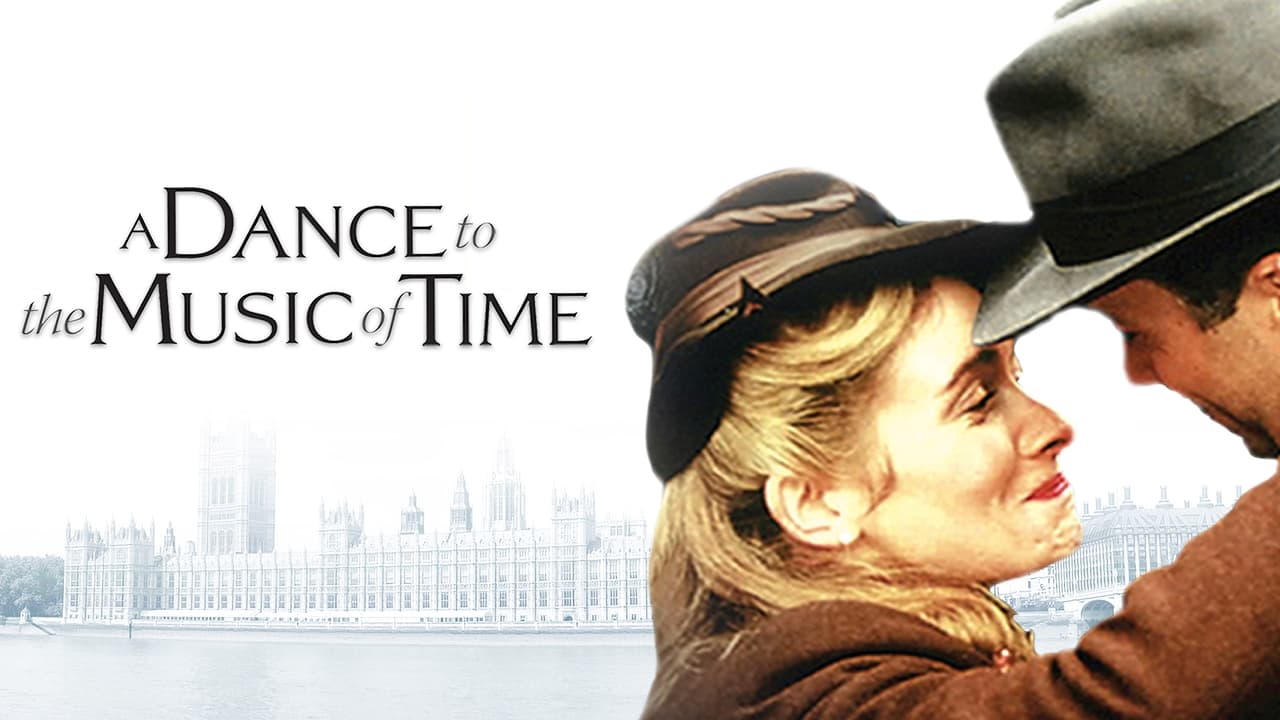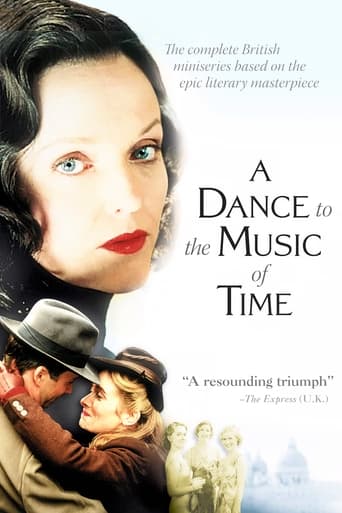



It was OK. I don't see why everyone loves it so much. It wasn't very smart or deep or well-directed.
View MoreIt is both painfully honest and laugh-out-loud funny at the same time.
View MoreGreat example of an old-fashioned, pure-at-heart escapist event movie that doesn't pretend to be anything that it's not and has boat loads of fun being its own ludicrous self.
View MoreStrong acting helps the film overcome an uncertain premise and create characters that hold our attention absolutely.
View MoreI should preface my remarks by saying that I've not read the source material (Anthony Powell's twelve semi-autobiographical novels) so I can't comment on that aspect of the story. My frustration with the protagonist Nick Jenkins passivity no doubt reflects Powell's original creation. I thought that James Purefoy did a credible job portraying Jenkins and it was a relief to see him take a break from the usual scenery chewing, sneering and smirking he so often exhibits in his period film performances. To the contrary -- he's understated and passive to the point of bewilderment which, I presume, was Powell's intention.Much of the rest of the cast is excellent (and any frequent viewer of British period films will recognize many fine character actors), although the characters themselves are often inexplicably unappealing. Throughout it all, Jenkins stays collegial, if not congenial, with every one of them, no matter how despicable they might be. That struck me as unbelievable, but again -- I suspect that Powell was using Jenkins as a personification of the British trait of "getting on with people". Fair enough.What, then, is my objection to "A Dance to the Music of Time"? They are three, two of which have to do with the structure of the story. First, the adaptation feels forced and is hugely uneven. You always know things are going badly in a film when characters employ declamation to introduce themselves. "Why hello, young Winston Churchill! You may not remember me, but I'm the Prince of Wales." (I just made that up for effect, but it reflects the tin-eared dialogue often employed in the miniseries when it needs to Tell Us Something.) Yes, it's madness to try to abridge 12 novels down to seven hours on film, but that decision largely doomed the miniseries' credibility.Second, the further along the film goes, the less focus it has. It wanders off into one utterly pointless subplot after another, trying to express the passage of time and zeitgeists along the way. No sale. It feels forced and perfunctory.Finally, due to the timeframe of the film (1920s through '60s), characters must age. And yet, for some inexplicable reason, James Purefoy is one of the very few who is replaced with a different (and older) actor, and one who looks nothing like him. This requires more awkward exposition ("Hello, Bill. You may not remember me, but I'm Nicholas Jenkins, even though I look nothing like the Nick Jenkins you knew in Episode Three.") Why was this done? Widmerpool and most of the other actors progressively age (to varying degrees of believability), but just swapping out the protagonist for a different actor torpedoes the film's credibility all the more. Inexplicably, Miranda Richardson not only portrays the same character throughout, she does not age one year. Absurd.Ultimately, this film left me scratching and shaking my head. Perhaps the books bring something more to the story, but the film felt like a contrived string of events both banal and pseudo-historic, with a hollow man at the center. We never care about any of the characters, nor do we see anything of substance inside of the protagonist. He's a cypher, an "everyman" and ultimately a bore to follow for seven hours.
View MoreThis is such an absorbing and brilliant drama series (4 episodes totalling 413 minutes) that it ranks as one of the finest ever made for British television. It is a condensation and adaptation of 12 novels by Anthony Powell (1905-2000), somehow miraculously crammed into this much shorter space by Hugh Whitemore, and don't ask me how he does it. The story of many interweaving characters follows them from their university days in the 1920s through to the early 1960s, taking in the War years in considerable detail. There are several Oscar-class performances in the series. One of these is by Simon Russell Beale, who makes the transition from boy to elderly man in a supernaturally convincing way as the character Kenneth Widmerpool. Other characters had to be replaced as they aged, sometimes even twice, but Beale goes all the way. Certainly the makeup people deserve gold medals for pulling that off. His searing performance wholly dominates the series, and is one of the greatest of our time. In terms of intensity of emotion of people at the limits of desperation, two others take the laurels. They are Miranda Richardson as Pamela Fitton and Paul Rhys as Christopher Stringham. Probably these are the finest performances in their respective careers. This series ought to be studied minutely in all drama schools to teach the young 'uns how things are done by the best of their profession. James Purefoy excels as the lead character Nick Jenkins, though in the final episode he is replaced by an older actor whose name does not appear on the IMDb cast list, alas. Jenkins is the languid observer and occasional narrator of the story, who becomes a novelist and to some extent represents Powell himself. Magnificent cameo appearances by Alan Bennett as Sillery are so wonderful that the series is worth watching just for him alone. James Villiers appears in the first episode but is not listed with IMDb either, I notice. My old friend Bryan Pringle plays a butler in a most amusing way. The casting is brilliant, because everybody is just right. No one could have played Jenkins's Uncle Giles so slyly and with such exquisite mannerisms as Edward Fox. James Fleet is perfect as the composer Moreland, Zoe Wanamaker is disturbingly hard and brittle as Audrey Maclintick, just as she is supposed to be, Jonathan Cake is perfect as Peter Templer, and one could go on and on listing them all and how fine they were. The direction alternates between Alvin Rakoff and Christopher Morahan, with Rakoff directing episodes 1 and 3, and Morahan directing episodes 2 and 4. Rakoff produced and Whitemore was Executive Producer. No expense was spared for this series, and some of the location shooting even took place in Venice, despite it being rather a minor bit of background for the story. Occasionally screen time is wasted by lingering over things for too long, such as Jenkins's officer training course for the War; we did not really need to see him falling into a bed of leaves and getting them up his nose. The title of the series of novels and the TV series derives from a painting by Poussin of that name, which shows figures engaged in a round dance of rising and falling fortunes, and we recur to this painting throughout the series, where the point is not rubbed home too obviously, but is made very tastefully. This is a multiple life-saga which shows how people begin, how they interact over the decades, and how they end. So many dreams turn to dust, so many relationships go sour, and Miranda Richardson and Paul Rhys both disintegrate in front of our eyes in portrayals of some of the most desperate human despair ever committed to film. One thing which is particularly notable about the script and the series is the extraordinary command which most of the characters have over language, and the superb ways they have of expressing themselves even in their worst moments. This ranks as probably the most literate of all modern TV series. Watching it comes near to being a course in how to speak and express oneself properly, and the eloquence of Paul Rhys as he dissolves as a personality is outstanding in its pathos. The fact is that all of these people, even the rough characters, know how to speak English, and there are not many people who do anymore. So rapidly have speech and the language declined that even though this was made as recently as 1997, it already seems nearly as far away as Shakespeare. We now live in a debased era where few people under 30 can read, write, or count properly, much less speak coherently. Such has been the total collapse of educational standards and the eradication of culture, not to mention the damage done by text messaging and the grunting in imitation of footballers which takes the place of speech amongst large segments of the population who now think it is more fashionable to make animal sounds than to use their tongues and teeth to articulate recognisable language. One day, in a wholly grunt-filled world, someone may come across an old DVD of this series, find an antique machine to play it on, and not understand a word of what anyone says, because it is all expressed in a dead language called English, which ceased to be spoken about the year 2000. If there is still such a thing as electricity in the future (since no one is building any power stations to replace the old ones, except in China), and if there are still people left with minds not wholly dulled, and should they come across a way of viewing this old TV series, they will learn about something called the twentieth century, in a most vivid and unforgettable way. This series truly is a triumph of artistic integrity, talent, and sheer genius.
View MoreThey don't make adaptations like this any more - no doubt for cost reasons and a lack of imagination and bravery at the TV companies. 7 hours of solid drama, yet full of incidental humour and some very fine characterisations.Unfortunately it is flawed, and the flaws make it just very good viewing rather than the excellent series it should have been. The biggest flaws to my mind are: 1 The decision to replace Nick and his wife by new actors for Film 4 was totally wrong. Nick ages far too much in too short a space of time, and looks completely different. This creates a real problem of believability.2 Still on ageing, some of the actors are 'aged' very well, whilst others (especially the ladies and Odo) seem hardly any different as the decades progress.3 Film 4 is by far the weakest, though to be fair this reflects the books on which it is based. Perhaps it should have been cut further and the earlier years given even greater prominence.4 Despite a great deal of pruning, there are still too many characters and insufficient narration for non-aficionados of the books to be sure all the time of who is who.5 The scenes often seem to be a succession of dramatic deaths - difficult to avoid with the way the story has to be condensed, but very predictable nonetheless.However, it's still pretty good, and light years removed from much of the dumbed-down drama on TV today.
View MoreOnce again BBC show us the pride of British drama, giving us a full account of this incredible Anthony Powell saga. Not only does it contain a rich historical scenery, but also something of a philosophical clue of how life actually works. Starting off in Uni environment, we get to know young Nick Jenkins - a man in the middle in a circle of friends. Moving on in life is inevitably also a break up from this social network. As the inter war periods goes on, Nick meets his old friends (and friends of friends) in the most unexpected ways. Ever so slowly a pattern emerge, that is somehow life itself - we move around, get married, divorced, change political opinions in a series of shorter and longer encounters. As Poussin's painting has it - A Dance to the Music of Time. A true masterpiece.
View More